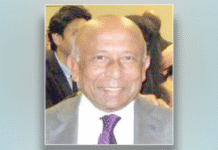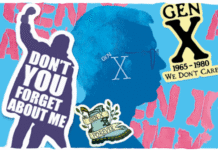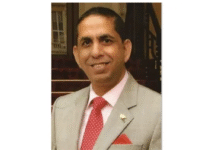“When the factory caught on fire, I was stuck inside the burning factory for hours. It was pitch dark. I was inhaling smoke, screaming from my guts, running around to get out. [I] tripped over a sewing machine and fell down. My nose started bleeding immediately…”
The 16-year-old girl who gave this account of the Tazreen factory fire does not say much more on September 10, the day she is admitted to United Hospital. After undergoing radiation treatment, she lies on a gurney in a small room, mutters in pain, and touches a slender hand to the eye that has been pushed outward by a tumour in her brain. Sumaya Khatun, a former Tazreen worker, suffered minor injuries in the factory fire last November. Soon after, she developed a rare kind of brain tumour – a sickness that started with a bleeding nose during the fire itself. The disease now threatens her life.
The question is not whether she is due worker’s compensation for the fire (she certainly is). It is not whether she will recover from her brain tumour (she almost certainly will not). It is not whether she would be better off in an Indian hospital, or if the authorities will permit her to go there (her doctor, Sunatu Chaudhuri, says, “The consequence would be the same”). The question is whether Sumaya will get the money to pay for hospital care during her remaining weeks. In the midst of a worldwide vogue for unconditional cash transfers to the poor, Sumaya has received little of the financial help she needs.
Unconditional cash transfers are a new programme gaining attention worldwide. They alter long-running conditional cash transfer (CCT) programmes, which provide money to impoverished families in poor countries if they participate in activities such as preventive medical care. CCT programmes assumed people would misuse their money if they were not told what to do. But studies have found nearly everyone spends the money wisely, and requirements do little to increase this overwhelming positive effect. So a new programme, unconditional cash transfer (UCT), now offers money to poor families with no strings attached.
In Bangladesh, micro-lending is favoured. (In fact, Sumaya’s mother Amiran, a brick field labourer, took a loan to pay for Sumaya’s first medical visits.) The only people considered entitled to unconditional pay-outs in Bangladesh today are people injured in recent industrial disasters.

Photo: Reuters
This has led to the strange argument that Sumaya should get worker’s compensation because the fire caused her deadly illness. This logic has been used to fund-raise internationally on her behalf. But United Hospital oncologist Sunatu Chaudhuri says he doesn’t see a connection between Sumaya’s tumour and the fire. It is unlikely that a blow to the outside of the nose could cause damage in a different body part that would then become an aggressive tumour within a few short weeks. The fire and the start of Sumaya’s illness are probably unrelated events.
But this matters little. It is odd that Sumaya should be asked to prove her disease arose from the fire in order to deserve compensation. After all, factory owner Delwar Hossain has never been asked to disprove his fault for the factory’s poor fire safety to justify his keeping the factory’s profits. (In late April, Bangladesh Institute of Labor Studies said the Bangladesh Garment Manufacturers and Exporters Association has not put a single factory owner on trial in over 23 years. Activists will attend the High Court on September 17 to ask the BGMEA to press charges on Tazreen owner Delwar Hossain.) No one asks him what he needs that money for. Hossain has found a way to secure the world’s largest unconditional cash transfer ever – and is one of a very few people to use the money so unjustly.
Sumaya, like poor people around the world, should get the money simply because she needs it. There is no doubt how she will use it. Financial constraints have delayed her care several times as activists tried to raise money for her. The gaps accelerated the spread of her disease. The money will cover her hospital care.
Sumaya is in constant pain now. She is blind in the right eye, and swiftly losing her vision in the left. On the day this week when I met Sumaya in the hospital, she had become too sick to carry on a conversation. But an earlier comment she made, posted on Facebook in translation, makes clear her suffering and loss of mental clarity: “The black poisonous smoke I inhaled while I was inside the blazing factory now turned into small insects. They bite me from inside. They like to eat my brain. These monstrous ants are walking beneath my skin, right here, behind my eyebrows…. They will eat me alive.”
There is no condition that anyone could impose on money given to Sumaya, and there is nothing to be gained by denying her help. She needs an unconditional, compassionate cash transfer right now.
The donors who are helping Sumaya are doing right. Mr. Hossain and the BGMEA should follow their lead.
Source: bdnews24










